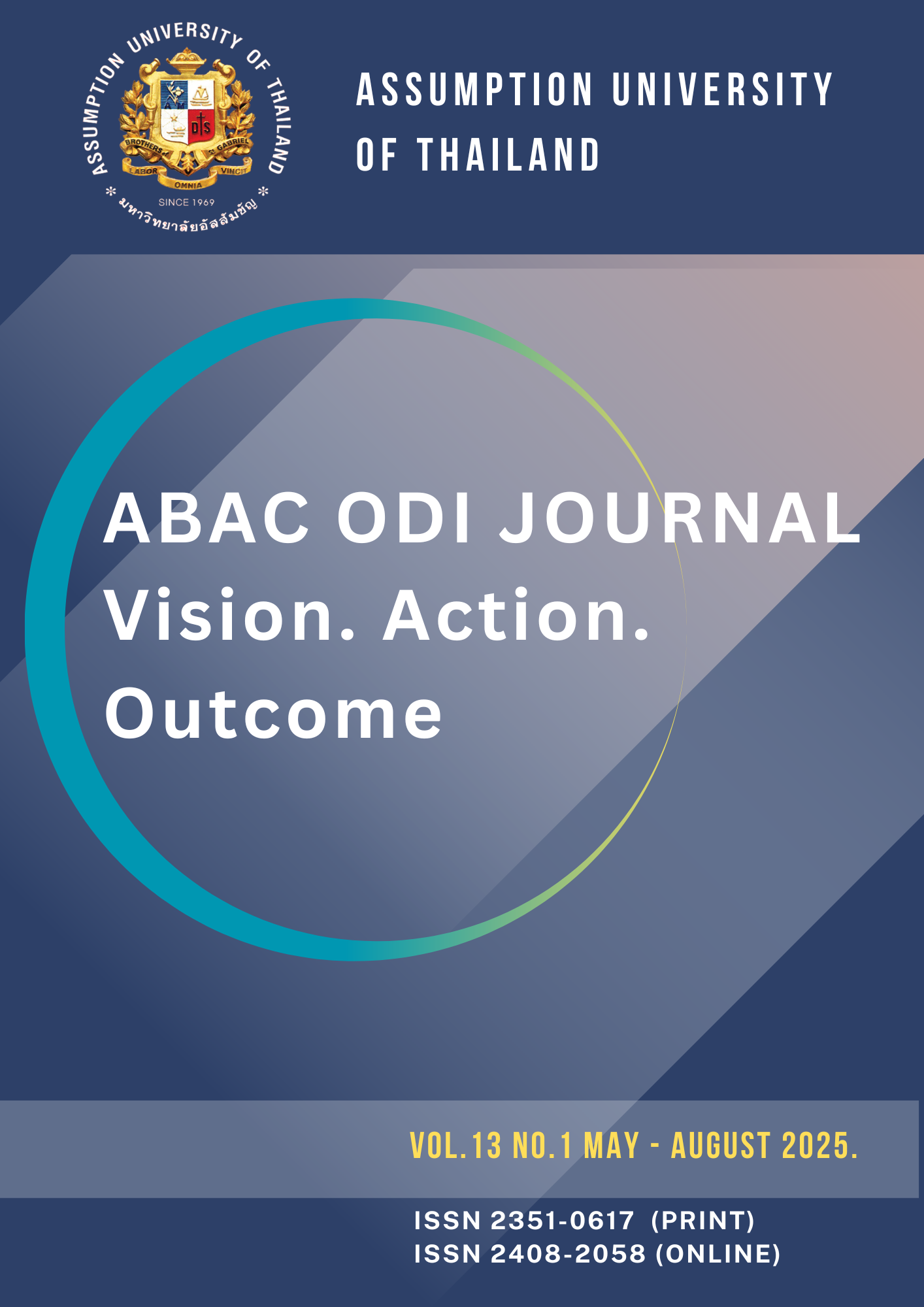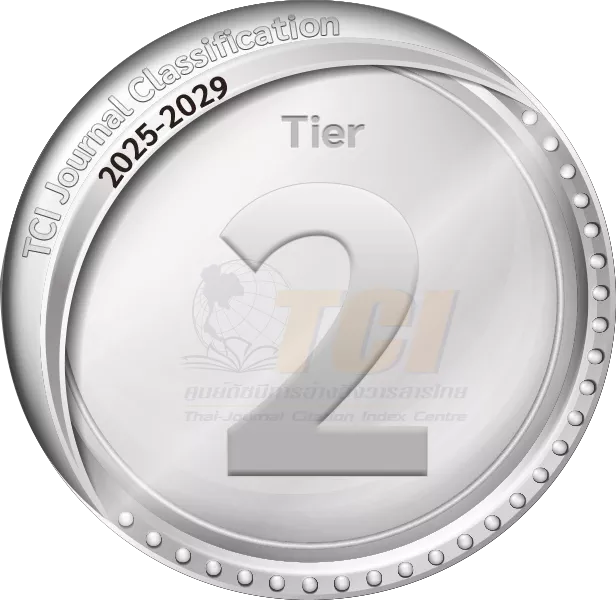The Influence of Internship Effectiveness on Graduate Employability Skills of Undergraduate Business Administration Students at a Private University in Thailand
DOI:
https://doi.org/10.14456/abacodijournal.2025.33Keywords:
Business Administration Students, Graduate Employability Skills, Internship EffectivenessAbstract
Internships for business students need to be effective as they play an important role in preparing students for the workforce. This quantitative study aimed to investigate the influence of Internship Effectiveness, as defined by Academic Preparedness, Positive Attitude, Self-initiative, Challenging Tasks, Effectiveness of Supervision, Task Clarity, and Compensation, on Graduate Employability Skills of undergraduate business administration students at a private university in Thailand. The Model of Internship Effectiveness and CareerEDGE Model of Graduate Employability guided as the theoretical framework. Data was collected through a self-reported questionnaire adopted from Phoebe (2010) and Dacre Pool et al. (2014) and a convenience population sample of 72 students participated. Descriptive statistics (mean and standard deviation) and multiple linear regression analysis was employed. Findings revealed moderately high levels of both internship effectiveness and graduate employability skills. While Academic Preparedness, Positive Attitude, and Effectiveness of Supervision, were positively correlated with Graduate Employability Skills, these correlations were not strong enough to have significant, predictive linear relationships. Self-initiative and Task Clarity demonstrated significant, positive predictive relationships with Graduate Employability Skills, explaining 76.1% of the variance. An inverse relationship was found for Compensation that belonging to certain compensation group is associated with lower predicted Graduate Employability Skills, however, the differential effect was not significant. These findings show that by prioritizing Self-initiative and Task Clarity during internships, these aspects can enhance undergraduate business administration students’ Graduate Employability Skills in this context.
References
Asian Development Bank. (2011). Higher education across Asia: An overview of issues and strategies. https://www.adb.org/sites/default/files/publication/29407/higher-education-across-asia.pdf
Bawica, I. M. (2021). The Effects of Internship Program on the Employability Readiness. International Journal of Academe and Industry Research, 2(3), 86-101.
Beard, F. K. (1997). Inside the advertising and public relations internship [Paper presentation]. Annual conference of the Association for Education in Journalism and Mass Communication.
Beard, F., & Morton, L. P. (1999). Effects of internship predictors on successful field experience. Journalism & Mass Communication Educator, 53(4), 42-53.
https://doi.org/10.1177/107769589805300404
Berger, J. (1992). Making an internship work. In A. Ciofalo (Ed.), Internships: Perspectives on experiential learning (pp. 211-218). Krieger Publishing Company.
Bourland-Davis, P. G., Graham, B. L., & Fulmer, H. W. (1997). Defining a public relations internship through feedback from the field. Journalism & Mass Communication Educator, 52(1), 26-33.
Bunchutrakun, C., Lieungnapar, A., Aeka, A., & Kunnu, W. (2019). The study of problems during internship program of business English undergraduates and their suggestions [Paper presentation]. International Conference on Business and Technology Studies (ICBTS).
Carrera, M. (2024). How Thai universities can better prepare graduates for the workplace. Journal of Business Leadership and Management, 2(1), 1-9.
https://doi.org/10.59762/jblm845920462120240205150242
Chia, Y., & Sheng, Y. Z. (2022). From Lifelong Learning to Lifelong Employability: How Skills Future has reconceptualised Higher Education for the Future of work. Knowledge studies in higher education, 179-194.
https://doi.org/10.1007/978-3-031- 05716-8_9
Chitviriyakul, A. (2023, March 5). Students fear for job prospects. Bangkok Post. https://www.bangkokpost.com/thailand/special-reports/2520665/students-fear-for-job- prospects
Cohen, J. (1988). Statistical power analysis for the behavioral sciences (2nd ed.). http://www.utstat.toronto.edu/~brunner/oldclass/378f16/readings/CohenPower.pdf
Crumbley, D., & Sumners, G. E. (1998). How businesses profit from internships. Internal Auditor, 55, 54-59
Dacre Pool, L., & Sewell, P. (2007). The key to employability: developing a practical model of graduate employability. Journal of Education and Training, 49(4), 277-289.
https://doi.org/10.1108/00400910710754435
Dacre Pool, L., Qualter, P., & Sewell, P. (2014). Exploring the factor structure of the CareerEDGE employability development profile. Education + Training, 56(4), 303-313. https://doi.org/10.1108/ET-01-2013-0009
Dixon, M. A., Cunningham, G. B., Sagas, M., Turner, B. A., & Kent, A. (2005). Challenge is key: An investigation of affective organizational commitment in undergraduate interns. Journal of Education for Business, 80, 172-180
Eraut, M. (2007). Learning from other people in the workplace. Oxford Review of Education, 33(4), 403-422.
Forrier, A., Sels, L., & Stynen, D. (2009). Career mobility at the intersection between agent and structure: A conceptual model. Journal of Occupational and Organizational Psychology, 82(4), 739-759. doi: 10.1348/096317909X470933
Fugate, M., Van der Heijden, B., De Vos, A., Forrier, A., & De Cuyper, N. (2021). Is what’s past prologue? A review and agenda for contemporary employability research. Academy of Management Annals, 15(1). https://doi.org/10.5465/annals.2018.0171
Gupta, P. B., Burns, D. J., & Schiferl, J. S. (2010). An exploration of student satisfaction with internship experiences in marketing. Business Education & Administration, 2(1), 27-37.
Hair, J. F., Black, W. C., Babin, B. J., & Anderson, R. E. (2018). Multivariate Data Analysis (8th ed.). Cengage Learning.
Hamilton, R. A. (1992). Internships are key to direct marketing program. In A. Ciofalo (Ed.), Internships: Perspectives on experiential learning (pp. 219-221). Krieger Publishing Company.
Helyer, R., & Lee, D. (2014). The role of work experience in the future employability of higher education graduates. Higher Education Quarterly, 68(3), 348-372.
https://doi.org/10.1111/hequ.12055
Hempel, K., & Pantelic, S. (2020). A Framework for Quality Internships: Promoting Early Work Experience for Young People. Prospera Consulting.
Isa, F. M., Noor, S., Ahmdon, M. A. S., Setiawati, C. I., & Tantasuntisakul, W. (2020). Comparison of students' perception about curriculum design versus employability in Malaysia, Indonesia and Thailand. International Journal of Management in Education, 14(4), 331-351. https://doi.org/10.1504/IJMIE.2020.107997"
Jackson, D. (2013). Student perceptions of the importance of employability skills pro- vision in business undergraduate programs. Journal of Education for Business, 88, 271-279.
Jiracheewewong, E. (2022). Does Higher Education Enhance Employability Skills Enough for Today’s Graduates?. STOU Educational Journal, 15(2).
https://so05.tci- thaijo.org/index.php/edjour_stou/article/view/258393
Jiracheewewong, E., Yongxia, M., & Han, X. (2017). The determinants for best employability skills and job opportunities for undergraduate students majoring in Chinese in Thailand. Education and Urban Society, 51(7), 989-1004.
https://doi.org/10.1177/0013124517747684
Johnson, D. (2000). The use of learning theories in the design of a work-based learning course at masters level. Innovations in Education and Training International, 37(2), 129-133.
Kapareliotis, I., Voutsina, K., & Patsiotis, A. (2019). Internship and employability prospects: assessing student’s work readiness. Higher Education, Skills and Work-based Learning, 9(4), 538-549. https://doi.org/10.1108/heswbl-08-2018-0086
Karunaratne, K., & Perera, N. (2019). Students’ Perception on the Effectiveness of Industrial Internship Programme. Education Quarterly Reviews, 2(4), 1-15.
https://ssrn.com/abstract=3507959
Lo Presti, A., & Pluviano, S. (2016). Looking for a route in turbulent waters: Employability as compass for career success. Organizational Psychology Review, 6(2), 192-211.
https://doi.org/10.1177/ 2041386615589398
Lo Presti, A., Capone, V., Aversano, A., & Akkermans, J. (2022). Career competencies and career success: On the roles of employability activities and academic satisfaction during the school-to-work transition. Journal of Career Development, 49(1), 107-125.
https://doi.org/10.1177%2F0894845321992536
Mason, G., Williams, G., & Cranmer, S. (2009). Employability skills initiatives in higher education: What effects do they have on graduate labor market outcomes?. Education Economics, 17(1), 1-30.
Meyer, J. P., & Allen, N. J. (1988). Links between work experiences and organizational commitment during the first year of employment: A longitudinal analysis. Journal of Occupational Psychology, 61, 195-209.
Narayanan, V. K. (2010). Determinants of internship effectiveness: An exploratory model. Academy of Management Learning & Education, 9(1), 61-80.
Office of the National Economic and Social Development Council (NESDC). (n.d.). Thailand Social's Outlook of Q4/2022 and overview of 2022. https://www.nesdc. go.th/nesdb_en/ewt_dl_link.php?nid=4495&filename=social_dev_report
Phoebe, W. K. (2010). Determinants of internship effectiveness for university students in Hong Kong [Dissertation]. Hong Kong Baptist University.
https://libproject.hkbu.edu.hk/trsimage/hp/07051379.pdf
Phonkaew, S., Arphawatthanasakul, L., & Kittivoraphan, P. (2020). Essential job competencies in hospitality and tourism industry: An analysis of employer expectations for new-entry employees in Thailand. International Journal of Innovation, Creativity and Change, 14(7), 424-438.
Pusawiro, P. (2014, March 17). Effective internship in higher education: shaping bright futures. The Nation. https://www.nationthailand.com/perspective/30229365
Ramadhina, K. S., & Kemalasari, Y. A. (2023). How does compensation contribute to students’ internship Decision-Making steps in the digital economy era?. Advances in economics, business and management research/Proceedings of the 11th International Conference on Emerging Challenges: Smart Business and Digital Economy 2023 (ICECH 2023), 58-69. https://doi.org/10.2991/978-94-6463-348-1_7
Rothman, M. (2007). Lessons Learned: Advice to Employers from Interns. Journal of Education for Business, 82(3), 140.
Schwartz, R. C. (2010). A Potential Framework for An Internship Learning Program in Sport Management [Master’s Thesis]. University of Pennsylvania.
https://repository.upenn.edu/handle/20.500.14332/41910
Seidel, T., Rimmele, R., & Prenzel, M. (2005). Clarity and coherence of lesson goals as a scaffold for student learning. Learning and Instruction, 15(6), 539-556.
Shafie, L. A., & Nayan, S. (2010). Employability awareness among Malaysian under- graduates. International Journal of Business and Management, 5(8), 119-123.
Srisa-an, W., & Pramoolsook, I. (2018). Development of cooperative and work-integrated education in Thailand. In Y. Tanaka & K. E. Zegwaard (Eds.), Cooperative and Work-Integrated Education in Asia (pp. 105-127). Routledge.
Stewart, A., Owens, R., Hewitt, A., & Nikoloudakis, I. (2018). The Regulation of Internships: A Comparative Study. International Labour Organization.
Sumanasiri, E. G. T., Yajid, M. S. A., & Khatibi, A. (2015). Conceptualizing Learning and Employability “Learning and Employability Framework. Journal of Education and Learning, 4(2), 53-63. https://doi.org/10.5539/jel.v4n2p53
Tackett, J., Wolf, R., & Law, D. (2001). Accounting interns and their employers: Conflicting perceptions. Ohio CPA Journal, 60, 54-56.
ThaiPBS World. (2022). Views of employers on hiring new graduates. ThaiPBS World. https://www.thaipbs.or.th/program/ThisweekThaipbsworld/watch/VZa8QN
Thijssen, J. G., Van der Heijden, B. I. J. M., & Rocco, T. S. (2008). Toward the employability—link model: current employment transition to future employment perspectives. Human Resource Development Review, 7(2), 165-183.
Trading Economics. (n.d.). Thailand job vacancies.
https://tradingeconomics.com/thailand/job-vacancies
Trotskovy, E., & Sabag, N. (2010). Internship in engineering design at hi-tech industries: theory and practice [Paper presentation]. IEEE-IBM TEE 2010 – Transforming Engineering Education Conference, Dublin.
UNESCO National Commission. (2022). Higher Education Report: Thailand. UNESCO World Higher Education Conference (WHEC2022).
Wye, C., & Lim, Y. (2009). Perception differential between employers and under- graduates on the importance of undergraduate skills. International Education Studies, 2, 95-105.




